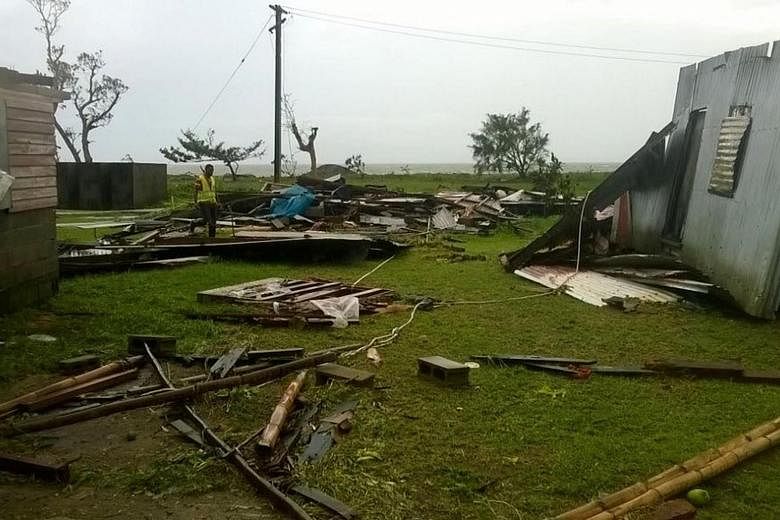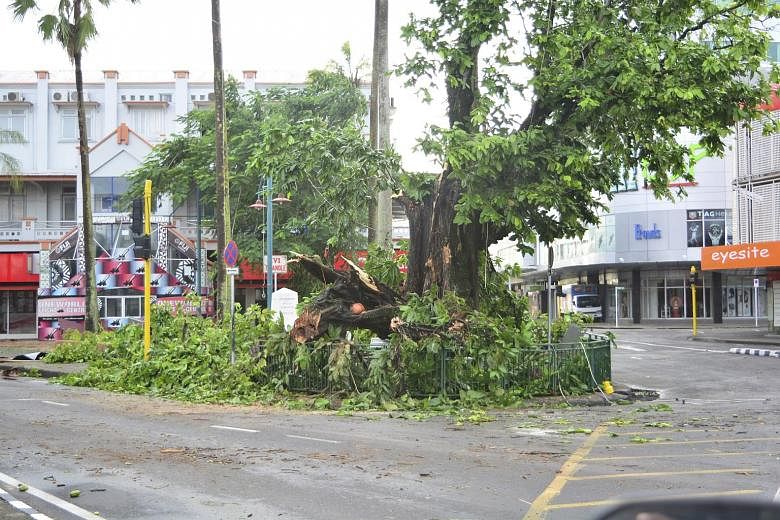SUVA, Fiji (AFP) - Tourists began fleeing cyclone-devastated Fiji on Monday (Feb 22) amid fears that the death toll from the most powerful storm to ever hit the Pacific island nation is set to rise steeply.
The official body count from severe tropical cyclone Winston stands at six but the Fiji Broadcasting Corporation reported at least 10 were dead, with fears for another seven fishermen missing at sea.
The super-storm lashed the popular tourist destination overnight on Saturday, packing gusts of 325 km per hour.
It was the first maximum category five cyclone to hit Fiji and left a trail of destruction, flattening scores of homes and crippling infrastructure.
Oxfam's Pacific regional director Raijeli Nicole said some of the remote communities that bore the brunt of the storm had still not been heard from and officials feared the worst.
"The Fijians are desperately trying to repair severed lines of communication, but they hold grave fears that the news waiting for them will be dire," she said.
"Given the intensity of the storm and the images we have seen so far, there are strong concerns that the death toll won't stop climbing today and that hundreds of people will have seen their homes and livelihoods completely destroyed."
International tourists caught up in the disaster began to leave as flights resumed at Nadi airport after a two-day suspension.
Air New Zealand confirmed one of its aircraft departed at 9.30am local time and other carriers including Jetstar, Virgin Australia and Fiji Airways were also expected to begin operations again.
Fiji's economy relies on tourism and the island chain is a major destination for Australians and New Zealanders.
Melbourne tourist Jeremy Bree told the Australian Broadcasting Corporation that he heard trees being ripped from the ground as he sat out the storm in a hotel at Denaru on the main island Viti Levu.
"It was pretty amazing just looking out and seeing the wind gusts just absolutely buffeting the trees," he said.
"The noise around was something I've never heard before, it was a real harrowing whine that came through."
The airport's opening allowed aid efforts to ramp up, with Australia announcing a A$5 million (S$5 million) package including basics such as food and drinking water.
Foreign Minister Julie Bishop said Canberra had also offered the use of a P-3 Orion aircraft and MRH-90 helicopters to reach outlying islands.
"The full impact of this disaster is still not known. We stand ready to provide further assistance to support Fiji's relief and recovery effort," she said.
The island nation has declared a month-long state of natural disaster after the storm that Prime Minister Voreqe Bainimarama described as an "assault on Fiji".
All schools, many of which are being used as evacuation centres, were ordered closed for one week and military leave has been cancelled so troops can help with the clean-up.
The acting head of the Red Cross's Pacific office Ahmad Sami said an accurate assessment of the storm's impact would take time.
"We anticipate that humanitarian needs will be very high," he told AFP.
"This is the first time that Fiji has experienced a cyclone of this magnitude in their history, a category five, so we're still trying to find out the figures."
He said priorities were restoring power and repairing damaged homes, as well as maintaining drinking water supplies in more than 700 evacuation centres.







